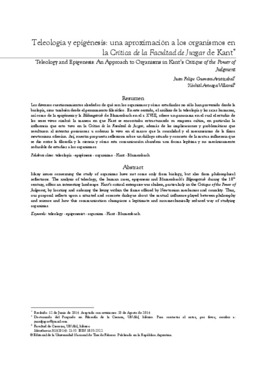Teleología y epigénesis : una aproximación a los organismos en la Crítica de la facultad de juzgar de Kant
Teleology and epigenesis : an approach to organisms in Kant’s Critique of the power of judgment

View/
Date
2014-10-01Author
Guevara-Aristizabal, Juan Felipe; Arteaga-Villamil, XóchitlMetadata
Show full item recordAbstract
Los diversos cuestionamientos alrededor de qué son los organismos y cómo estudiarlos no sólo han provenido desde la biología, sino también desde el pensamiento filosófico. En este sentido, el análisis de la teleología y las razas humanas, así como de la epigénesis y la Bildungstrieb de Blumenbach en el s. XVIII, ofrece un panorama en el cual el estudio de los seres vivos cimbró la manera en que Kant se encontraba estructurando su empresa crítica, en particular la influencia que esto tuvo en la Crítica de la Facultad de Juzgar, además de las implicaciones y problemáticas que resultaron al intentar posicionar u ordenar lo vivo en el marco que la causalidad y el mecanicismo de la física newtoniana ofrecían. Así, nuestra propuesta reflexiona sobre un diálogo situado y concreto de la mutua influencia que se dio entre la filosofía y la ciencia y cómo esta comunicación abandera una forma legítima y no mecánicamente reducible de estudiar a los organismos. Many issues concerning the study of organisms have not come only from biology, but also from philosophical
reflections. The analysis of teleology, the human races, epigenesis and Blumenbach’s Bilgungstrieb during the 18th century, offers an interesting landscape. Kant’s critical enterprise was shaken, particularly in the Critique of the Power of Judgment, by locating and ordering the living within the frame offered by Newtonian mechanics and causality. Thus,
our proposal reflects upon a situated and concrete dialogue about the mutual influence played between philosophy and science and how this communication champions a legitimate and non-mechanically reduced way of studying organisms.
